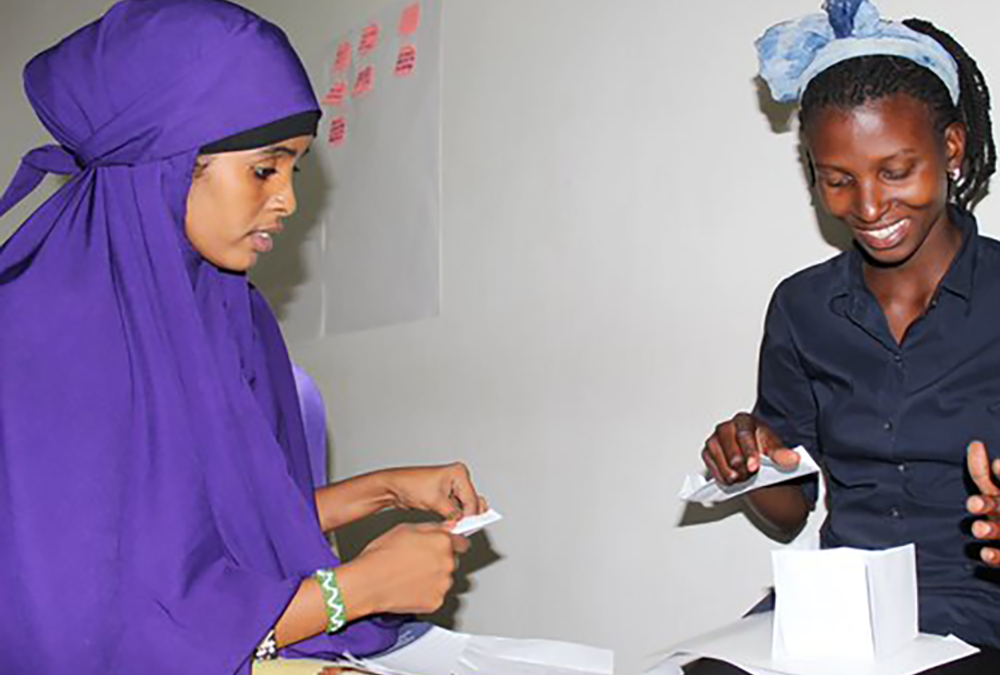Months into her first placement with UNHCR in Uganda, Keiko Odashiro was hit by a crisis of conscience. After years spent at the helm of her own organization – an NGO working around human trafficking and gender-based violence – she had made the switch to the U.N. Refugee Agency, hoping to make a difference in the lives of displaced populations. Her passion for the job had recently landed her a spot as an Innovation Fellow, which would provide her with support to pursue her projects.
But during the training seminar provided by the Innovation unit, Odashiro learned that the way she was used to manage new projects was not the best way to achieve success. “I realized how risky it is to develop projects without involving the very people we are trying to support, without prototyping, and without selecting the best idea that we know will work,” Odashiro recalls. She now understood that innovation was the result of a long iteration process that placed beneficiaries at the center of each project and required to make sure all stakeholders were actively engaged – something she had failed to do until then.
With this in mind, she set out to look for an opportunity to develop a project that would be more inclusive and collaborative. She knew she wanted to work with refugee youth, because their needs were often unaddressed by humanitarian programs.
“Every time I went out in a community, I’d hear the youth say that we were not paying attention to them, that nothing was done for them,” she remembers.
In Uganda, adolescents and young adults are under huge pressure to provide for themselves and their families. Many of them have to drop out of school to find work, and as a result must find precarious jobs that place them at risk of abuse from unscrupulous employers. Some girls turn to prostitution as a last resort to provide for their basic needs, Odashiro says.
At the same time, the refugee youth she spoke to were eager to take matters into their own hands. Some of them had taken to launching micro-enterprises through which they would design and sell crafts in the streets. But with no education, they lacked the skills to grow their businesses. “A lot of young people have great ideas, but don’t know where to start,” she says.
At another training provided by the design and innovation consulting firm Ideo a few months later, she met with young refugee leaders who were eager to find solutions for their communities. Together, they started brainstorming on how to meet the needs of refugee youths. The discussions carried on in the following weeks, and a new initiative eventually emerged.
One Youth One Heart, as the project would be called, was designed to support young leaders in their projects while bridging the gap between refugees and host communities. The project was created around a non-hierarchical structure to ensure that all participating voices were equal. Odashiro and the team chose to avoid using certain words that are traditionally used in humanitarian circles, such as “service,” “provide” and “assistance,” preferring to use terms like “co-create.”
“We’re building young people’s capacity to lead,” Odashiro says of the initiative. “You can’t learn how to be a leader from a book, you have to practice. We’re just providing an opportunity and space where they can practice leadership.”
Earlier in 2015, One Youth One Heart launched U-Spark Hub, an online platform where young social innovators can connect with potential mentors and donors. The project is currently in its piloting phase, with plans to launch a network of “innovation hubs,” or physical spaces where users who may not have access to the Internet at home can access the platform throughout the country.
Odashiro also helped develop a training curriculum called HANDS, which aims at fostering what she calls “creative confidence,” or the ability for people to develop homegrown solutions for local issues. “Often when we work with refugees, we have the tendency to protect them, but we fail to look at them as partners who have capabilities, who have strengths, and who could tremendously contribute to the development and design of projects,” she explains. “This kind of top-down approach really diminishes their potential to come up with their own solutions for their challenges, whether these are private or community challenges.” HANDS has been taught to One Youth One Heart team members, who will now be able to pass it on to other youths.
Odashiro was recently transferred to South Sudan, and although she keeps close contact with her former teammates, One Youth One Heart and the U-Spark Hub has taken off on its own, with support from the local UNHCR operation. That’s because every team member was actively involved in every step of the project, and developed a sense of ownership that will allow the project to go on with or without her. “The online platform may not be successful, or maybe they’ll come up with something else. But whatever they create, it will be theirs,” Odashiro says.
“They’ll learn from their mistakes, and develop new ideas. As long as they know they have this creative confidence, no matter how much they fail, they can just rise up and start anew.”

